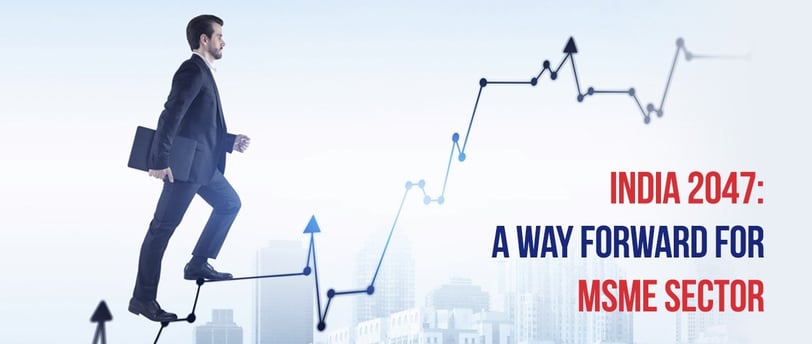Add your promotional text...
Empowering MSMEs: The Key to India's Economic Transformation by 2047
Synopsis :- MSMEs are the backbone of India's economy, contributing significantly to GDP, exports, and manufacturing. For India to achieve its goal of becoming a developed nation by 2047, innovative financial strategies, structural reforms, and government support are critical. This blog explores actionable recommendations for boosting MSME growth.
VIEWS ON NEWS
By Monika Agarwal
11/28/20243 min read


MSMEs – The Heart of India’s Economic Engine
Micro, Small, and Medium Enterprises (MSMEs) are more than just economic contributors; they are the lifeblood of India's economic framework. With a contribution of nearly 30% to the GDP, 45% to manufacturing output, and 46% to exports in FY 2024, MSMEs are indispensable to the nation's growth story. However, achieving India’s ambitious vision of becoming a developed nation by 2047 requires a paradigm shift in how MSMEs are supported and nurtured.
A report by Assocham, in collaboration with the Egrow Foundation, sheds light on strategic recommendations to strengthen MSMEs and unlock their potential for transformative growth.
Financial Innovations: The Need of the Hour
For MSMEs to thrive, innovative financial mechanisms and transparent banking processes are essential. The report proposes several solutions to address the sector’s financial challenges:
MSME-Specific Bonds and Mutual Funds
Introducing dedicated MSME bonds and mutual funds can enhance financial liquidity, providing businesses with access to much-needed capital for expansion and innovation.Mobile Banks for Informal Micro-Enterprises
Mobile banks can bridge the gap for informal micro-enterprises, particularly in rural and semi-urban areas, by offering accessible and efficient financial services.Expansion of Small Finance Banks (SFBs)
Scaling up SFBs can cater to underserved regions, ensuring MSMEs in rural areas have access to tailored financial solutions.Transparent Loan Approval Processes
Simplifying and streamlining loan approval processes while eliminating hidden charges can build trust and encourage MSME participation in formal banking systems.
Tax Reforms to Bolster MSME Growth
Taxation policies play a pivotal role in shaping the business landscape for MSMEs. The report highlights key tax-related recommendations:
Reduced Corporate Tax Rates: Lowering the corporate income tax for MSMEs from 25% to 15% can ease financial burdens and incentivize growth.
Simplified GST Compliance: A more straightforward Goods and Services Tax (GST) system can improve compliance and reduce administrative hassles for MSMEs.
Unified Tax System: Implementing a turnover-based unified tax system for smaller MSMEs can promote ease of doing business.
Alleviating the TDS Burden: Limiting tax deductions to essential payments can provide immediate relief to cash-strapped enterprises.
MSMEs and India’s Vision for 2047
As India aims to elevate its nominal GDP from $3.5 trillion to $22.8 trillion by 2047, MSMEs are expected to play a critical role in driving this transformation. The report projects a rise in per capita GDP from $2,485 to $14,000, fueled by a burgeoning and skilled workforce of 76.9 crore people.
Deepak Sood, Secretary General of Assocham, emphasizes the need for structural changes to integrate MSMEs into the larger economic transformation. “A developed India would have a vibrant role for the MSMEs. Our study underscores this point emphatically,” he stated.
Education and Innovation: Building MSME Ecosystems
The report proposes an innovative idea of establishing state-specific MSME universities, akin to agricultural universities, to support local businesses. These institutions can provide:
Training in modern business practices.
Research and development support.
Assistance in product innovation and market expansion.
Dr. Charan Singh, Founder of Egrow Foundation, highlights the demographic dividend as a unique advantage for India. MSMEs can absorb this growing workforce, creating productive employment and driving economic growth.
Overcoming Challenges for MSMEs
While the recommendations present a roadmap for growth, MSMEs face persistent challenges that need to be addressed:
Access to Credit: Many MSMEs struggle to secure affordable credit due to stringent lending norms and lack of collateral.
Compliance Burden: Complex regulatory and tax compliance systems hinder operational efficiency.
Market Competition: MSMEs often face stiff competition from larger enterprises and imported goods.
Government intervention, along with collaboration between financial institutions, industry bodies, and policymakers, is crucial to overcoming these barriers.
Strategic Support for a Developed India
To achieve the goal of Viksit Bharat (Developed India), the Assocham-Egrow report stresses a unified approach involving the government, banks, and private conglomerates. Strategic support can empower MSMEs to innovate, expand, and compete on a global scale.
Sanjay Nayyar, President of Assocham, aptly summarizes this vision: “Our strong base of formal and informal entrepreneurs would need strategic support from the government, banks, and conglomerates to be a critical partner in realizing national aspirations.”
A Vibrant Future for MSMEs
India’s MSMEs hold the key to unlocking economic prosperity and achieving the nation’s 2047 vision. By implementing innovative financial solutions, reducing tax burdens, and fostering an ecosystem of education and support, MSMEs can rise to meet the demands of a transformed economy.
The journey to a developed India is one of collaboration, resilience, and strategic foresight—an endeavor in which MSMEs are poised to play a starring role.
